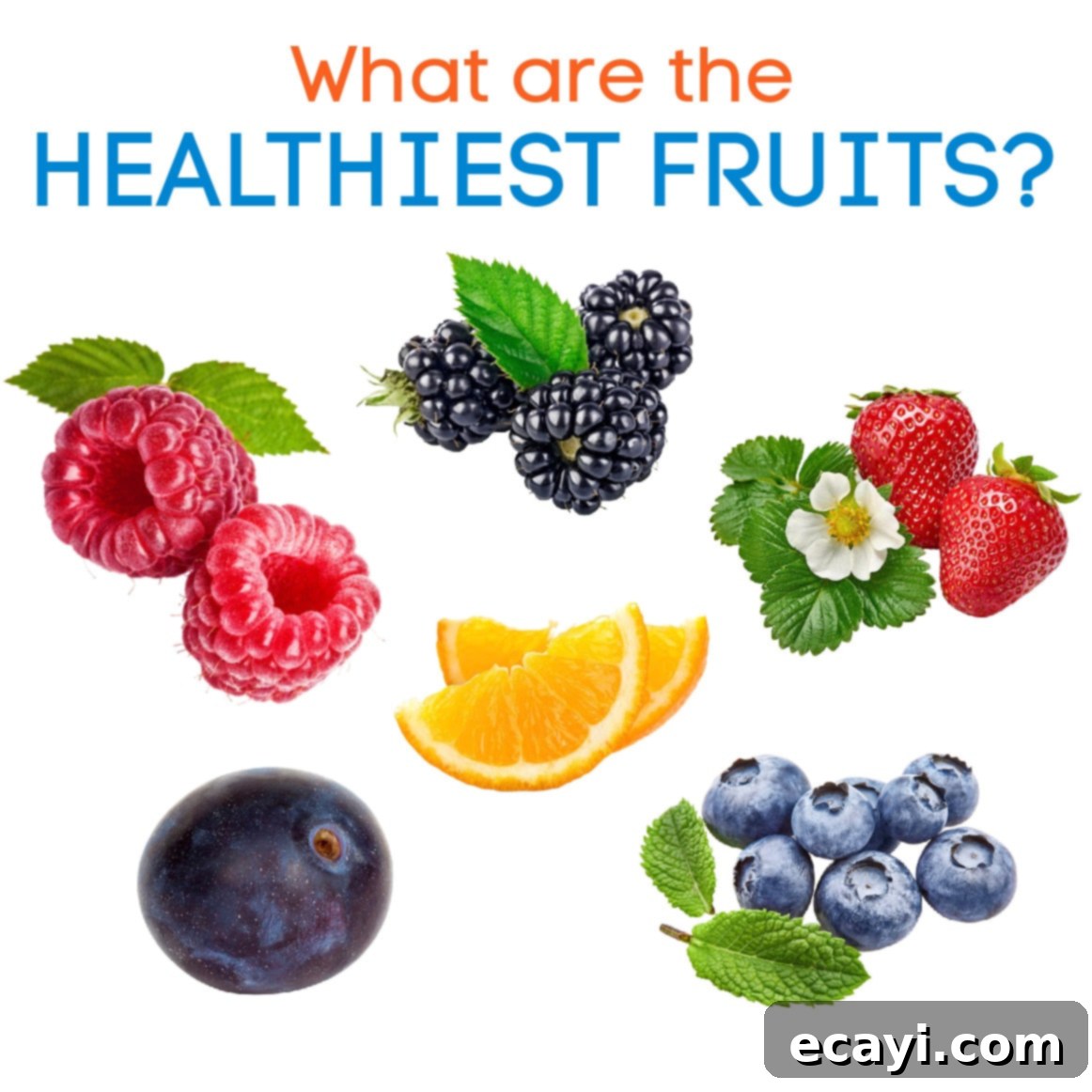The Ultimate Guide to Healthy Low-Carb Fruits: Benefits, Net Carbs & Smart Choices
Fruits are nature’s candy, packed with an abundance of essential vitamins, minerals, and potent antioxidants that make them invaluable components of a healthy and balanced diet. Each type of fruit offers its own unique profile of health benefits, contributing to overall well-being. However, with thousands of diverse fruits available globally, discerning which ones are truly the healthiest can be a challenge. Furthermore, for those monitoring their carbohydrate intake, perhaps due to a low-carb lifestyle, diabetes management, or specific health goals, the question of “low-carb fruits” becomes particularly important. How do these fruits fit into a carb-conscious eating plan, and which varieties should take precedence?
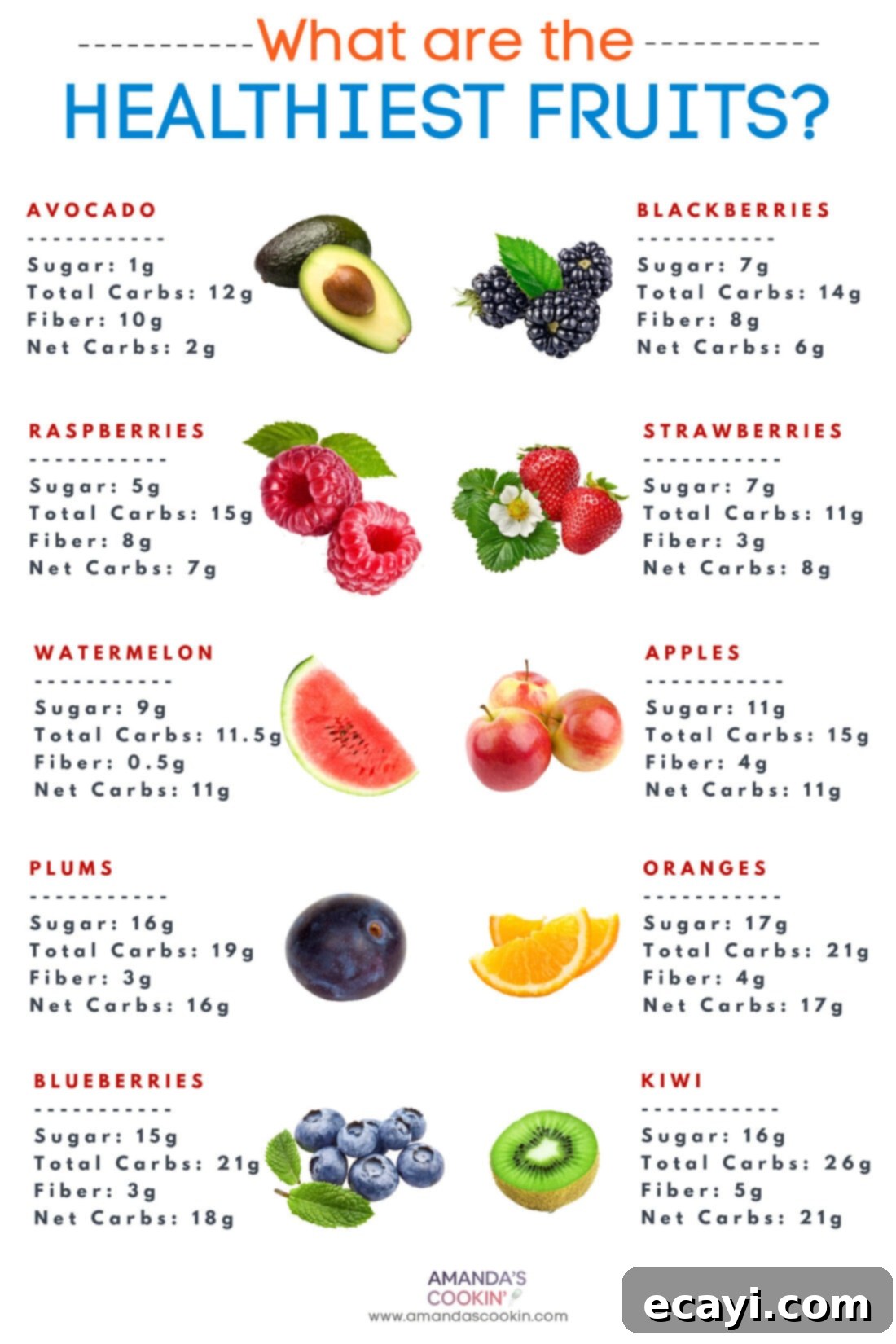
This comprehensive guide aims to demystify the world of healthy fruits, focusing specifically on those that are lower in sugar and carbohydrates. We’ll meticulously break down the healthiest fruits to integrate into your diet, evaluating them by their sugar and net carb content. Additionally, we’ll highlight some of the higher-sugar fruits that, while nutritious, should be enjoyed in moderation. Prepare your shopping list, because you’ll want to remember these incredible options to enhance your nutritional intake and support your health goals!
Total Carbs vs. Net Carbs: Understanding the Difference for Better Health
When navigating nutrition labels, especially for those on low-carb diets or managing blood sugar, terms like starches, sugar, and dietary fiber can be confusing. The key distinction lies in understanding “net carbs.” Net carbs refer only to the carbohydrates that your body fully digests and converts into glucose, thereby directly impacting your blood sugar levels. Other carbohydrates, primarily dietary fiber, pass through your digestive system largely undigested and do not convert into glucose, hence they don’t significantly affect blood sugar. This is why fiber is often subtracted when calculating net carbs.
To calculate net carbs from a nutrition label, simply take the “Total Carbohydrates” and subtract the “Dietary Fiber.” The resulting number represents the net carbs – the carbs that truly matter for blood sugar management and ketogenic or low-carb dietary approaches. For instance, if a fruit has 15 grams of total carbs and 5 grams of fiber, its net carb count is 10 grams. Understanding this concept empowers you to make informed choices, allowing you to enjoy a wider variety of fruits while staying within your carbohydrate targets and harnessing the immense health benefits that fiber-rich foods offer, such as improved digestion and sustained energy levels.
Best Low Sugar, Low Carb Fruits for a Health-Conscious Diet
For those mindful of sugar and carb intake, whether for weight management, diabetes control, or a low-carb lifestyle, this curated list presents some of the healthiest fruits, ranked from the lowest to highest in net carbs. Keep this essential guide handy as you plan your meals and snacks, ensuring you choose fruits that nourish your body without excessive sugar spikes.
Avocado
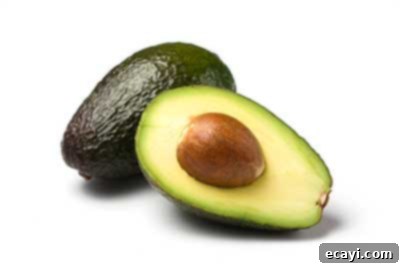
Often mistaken for a vegetable, the creamy, nutrient-dense avocado is botanically classified as a fruit, and an incredibly healthy one at that. Renowned for its generous supply of heart-healthy monounsaturated fats, particularly oleic acid, avocados are a cornerstone in many ketogenic and low-carb eating plans, contributing to satiety and overall well-being. Beyond healthy fats, this versatile fruit is a nutritional powerhouse, boasting over 20 essential vitamins and minerals, including significant amounts of Vitamin K, Vitamin C, Vitamin B6, Folate, and Potassium – often more potassium than a banana! Its rich fiber content further aids digestion and helps stabilize blood sugar levels. Incorporating avocado into your diet can support cardiovascular health, promote healthy skin, and enhance nutrient absorption from other foods, making it an excellent choice for a nutritious boost.
See all of our recipes using avocado.
Serving size: 1 cup
Sugar: 1 gram
Total Carbs: 12 grams
Dietary Fiber: 10 gramsNet Carbs: 2 grams
Blackberries
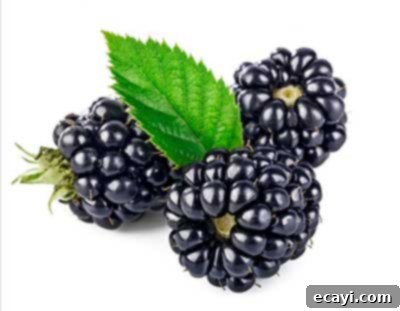
Not only are blackberries incredibly delicious with their sweet-tart flavor, making them perfect for treats like a Blackberry Mojito, but they are also powerhouses of nutrition. These vibrant berries are densely packed with vitamins (especially Vitamin C and K), minerals, and an impressive amount of dietary fiber. As a popular summer staple, blackberries offer a wide array of health benefits, including boosting brain health due to their high antioxidant content, supporting a robust immune system, and significantly increasing digestive health thanks to their fiber. Their low sugar and carb profile makes them an excellent choice for a nutritious snack or addition to salads and yogurts without compromising your dietary goals.
See all of our recipes using blackberries.
Serving size: 1 cup
Sugar: 7 grams
Total Carbs: 14 grams
Dietary Fiber: 8 gramsNet Carbs: 6 grams
Raspberries
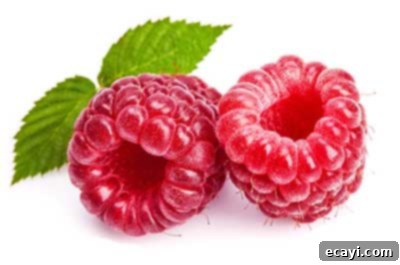
Ranked among the healthiest fruits you can enjoy, raspberries stand out for being remarkably low in sugar and extraordinarily rich in dietary fiber. These delicate berries are bursting with powerful antioxidants, beneficial phytonutrients, and a wealth of vitamins, making them a fantastic addition to any diet. If you’re looking to significantly increase your Vitamin C intake, raspberries are an excellent choice, containing over 32 milligrams per cup, which is crucial for immune function and skin health. Their high fiber content not only contributes to digestive regularity but also helps manage blood sugar levels, preventing rapid spikes. Enjoy raspberries fresh, in smoothies, or as a topping for yogurt and salads to reap their myriad health benefits.
See all of our recipes using raspberries.
Serving size: 1 cup
Sugar: 5 grams
Total Carbs: 15 grams
Dietary Fiber: 8 gramsNet Carbs: 7 grams
Strawberries

Strawberries, one of the world’s most beloved and popular low-carb fruits, are frequently enjoyed in delightful ways, from homemade jams to various baked goods. Despite their misleading name, strawberries are botanically classified as aggregate fruits, not true berries. These succulent red gems are an excellent source of beneficial nutrients, including a high concentration of Vitamin C (more than oranges per serving!), folate, manganese, and a rich array of antioxidants. Thanks to their relatively low glycemic index, strawberries have a minimal impact on blood sugar levels, making them a smart choice for individuals managing glucose. Regular consumption of strawberries can contribute to improved heart health, powerful anti-inflammatory effects, and enhanced immunity, all while offering a sweet, satisfying flavor.
See all of our recipes using strawberries.
Serving size: 1 cup
Sugar: 7 grams
Total Carbs: 11 grams
Dietary Fiber: 3 gramsNet Carbs: 8 grams
Watermelon
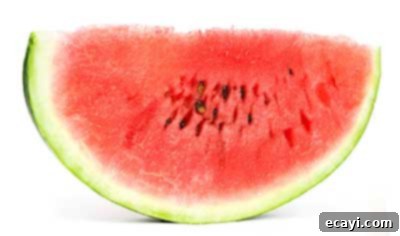
Arguably the quintessential fruit of summer, watermelon is celebrated for its refreshing qualities and delightful sweetness. Despite its sugary taste, watermelon is relatively low in sugar compared to many other fruits and boasts an exceptionally high water content, making it incredibly hydrating – perfect for warm weather. This juicy fruit is also an abundant source of essential vitamins, minerals, and powerful antioxidants like lycopene, which is known for its role in heart health and cancer prevention. Its nutrient density, combined with its hydrating properties and moderate carb count, makes it a highly nutritious choice for a light snack or a vibrant addition to any meal. For a deliciously healthy and fun summer dessert, be sure to try this creative Watermelon Pizza.
See all of our recipes using watermelon.
Serving size: 1 cup
Sugar: 9 grams
Total Carbs: 11.5 grams
Dietary Fiber: 0.5 gramsNet Carbs: 11 grams
Apples
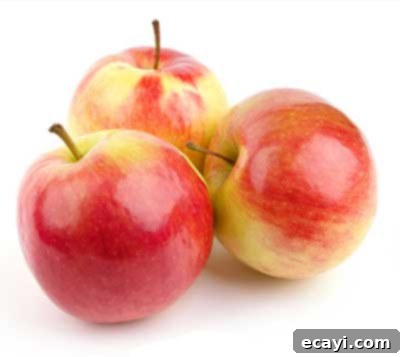
Often hailed as one of the best fruits for weight management, apples are naturally low in calories and remarkably high in dietary fiber, particularly pectin, a soluble fiber known for its gut-health benefits. Regular consumption of apples can unlock a wide range of health advantages, including robust digestion support, enhanced heart health through cholesterol reduction, and a lowered risk of various chronic diseases. A significant portion of an apple’s fiber and beneficial antioxidants resides in its skin, so it’s always best to enjoy them unpeeled to maximize their nutritional impact. Whether crunched fresh, sliced into salads, or baked into healthy treats, apples are a versatile and accessible fruit that contributes significantly to a healthy lifestyle.
See all of our recipes using apples.
Serving size: 1 cup
Sugar: 11 grams
Total Carbs: 15 grams
Dietary Fiber: 4 gramsNet Carbs: 11 grams
Plums
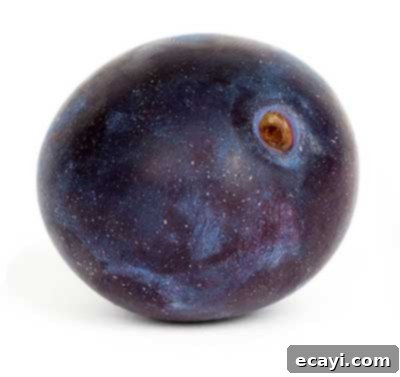
Originating in China thousands of years ago, this delectable stone fruit has journeyed across the globe and now boasts over 2,000 known varieties, each offering a unique flavor profile. Plums are packed with vital nutrients and possess a subtle sweetness that makes them ideal additions to refreshing smoothie bowls, healthy desserts, or simply enjoyed on their own. These small, juicy fruits are particularly renowned for their exceptionally high levels of antioxidants, which combat free radicals and support cellular health. Studies suggest that plums may possess significant cancer-fighting abilities and contribute to bone health. Their natural laxative effect, especially when dried as prunes, makes them excellent for digestive regularity, further cementing their status as a beneficial dietary choice.
See all of our recipes using plums.
Serving size: 1 cup
Sugar: 16 grams
Total Carbs: 19 grams
Dietary Fiber: 3 gramsNet Carbs: 16 grams
Oranges
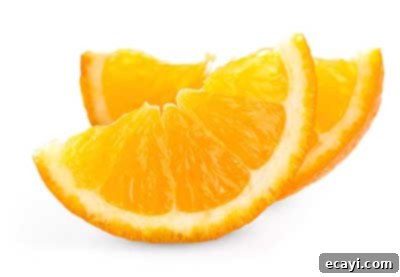
Universally recognized for their high content of Vitamin C, a single orange can provide an impressive 91% of the recommended daily value of this powerful antioxidant vitamin, crucial for immune function and collagen production. Beyond Vitamin C, oranges are densely packed with a high volume of other beneficial nutrients and antioxidants, making them one of the healthiest low-carb fruits to incorporate into your diet. The health benefits of oranges extend to decreasing blood pressure, reducing inflammation throughout the body, and helping to lower cholesterol levels. Their bright, tangy flavor makes them a refreshing snack, a great addition to salads, or a zesty component in various culinary creations, offering a burst of flavor and nutrients.
See all of our recipes using oranges.
Serving size: 1 cup
Sugar: 17 grams
Total Carbs: 21 grams
Dietary Fiber: 4 gramsNet Carbs: 17 grams
Blueberries
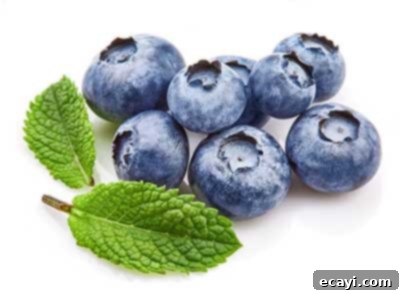
From delightful breakfast muffins to invigorating smoothies and refreshing cocktails, blueberries are undeniably one of the most popular and versatile low-carb fruits. While they may have a slightly higher sugar content compared to some other berries on this list, their nutritional value is immense. Blueberries are loaded with unique phytonutrients, particularly anthocyanins, which not only give them their characteristic blue hue but also possess properties that may help regulate blood sugar by blocking the absorption of certain sugars into the bloodstream. These small but mighty berries are also brimming with powerful antioxidants and essential vitamins that offer an abundance of health benefits, including lowering cholesterol, protecting the body from oxidative stress, enhancing brain function, and supporting overall cellular health. They are a delicious way to add concentrated nutrition to your diet.
See all of our recipes using blueberries.
Serving size: 1 cup
Sugar: 15 grams
Total Carbs: 21 grams
Dietary Fiber: 3 gramsNet Carbs: 18 grams
Kiwi
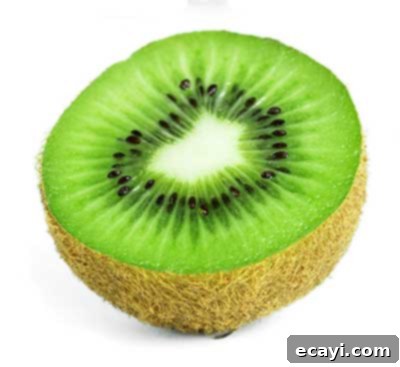
Did you know that the fuzzy-skinned kiwi is also widely known as the Chinese gooseberry? This vibrant green fruit has been valued in traditional Chinese medicine for centuries, particularly for its remarkable ability to support digestion and gut health. Kiwis are incredible sources of a wide array of vitamins (especially Vitamin C and K), essential minerals, dietary fiber, and beneficial polyphenols. Some of the top health benefits associated with regular kiwi consumption include a significantly boosted immune system, reduced blood pressure, and unparalleled digestive support due to its unique enzyme, actinidin. Its distinctive tart and sweet flavor makes it a refreshing addition to fruit salads or creative summer snacks like these homemade Fruit Popsicles. Don’t let its size fool you; kiwi is a nutritional powerhouse!
See all of our recipes using kiwi.
Serving size: 1 cup
Sugar: 16 grams
Total Carbs: 26 grams
Dietary Fiber: 5 gramsNet Carbs: 21 grams
High Sugar Fruits: Enjoying Nature’s Sweetness in Moderation
While every fruit offers a unique blend of essential vitamins, minerals, and powerful antioxidants that contribute to a healthy diet, some fruits naturally contain significantly higher amounts of sugar than others. For those monitoring their sugar intake or adhering to a low-carb regimen, it’s crucial to be aware of which fruits fall into this category and consume them in more controlled quantities. This doesn’t mean avoiding them entirely, as they still offer valuable nutrients, but rather enjoying them thoughtfully.
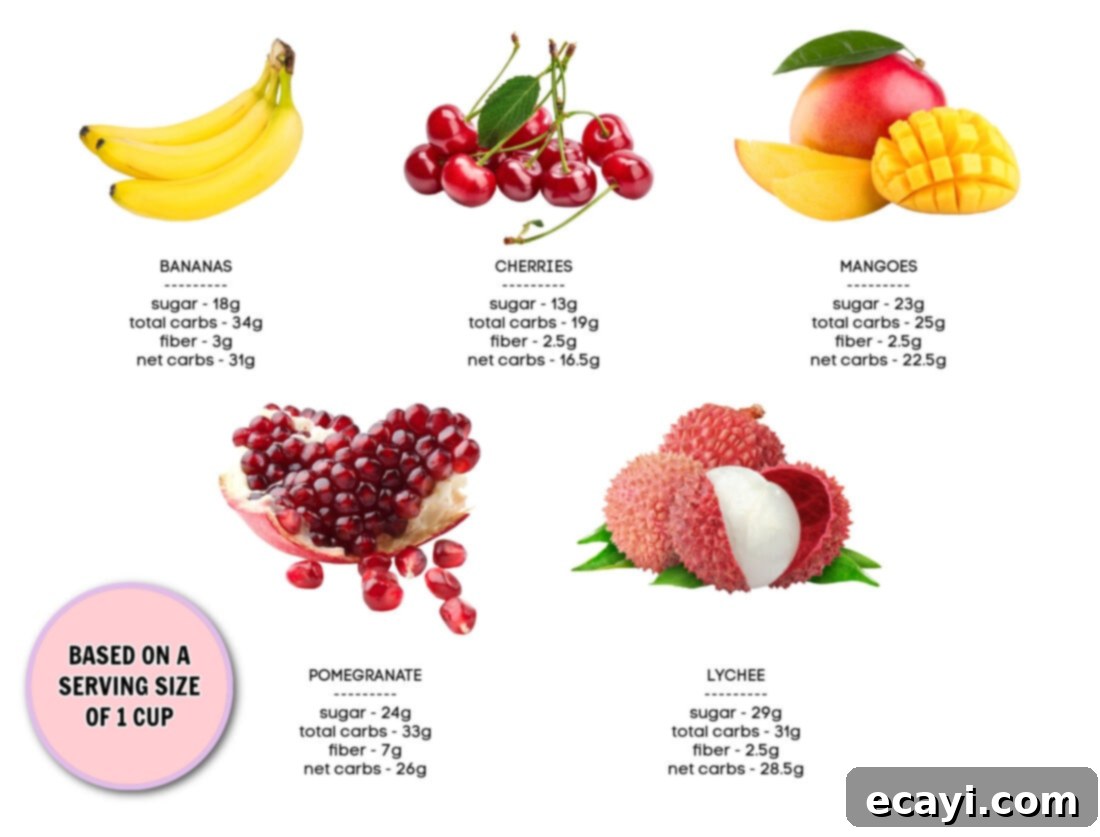
Below are some of the fruits with higher sugar content, along with their nutritional breakdown per 1-cup serving:
- Bananas – While higher in sugar, bananas are excellent sources of potassium, crucial for blood pressure regulation and nerve function. 18 grams of sugar, 3 grams of fiber and 34 grams of total carbs. [31 net carbs]
- Cherries – These delightful stone fruits are rich in antioxidants and boast anti-inflammatory properties, making them beneficial for muscle recovery and sleep. 13 grams of sugar, 2.5 grams of fiber and 19 grams of total carbs. [16.5 net carbs]
- Mangos – Known as the “king of fruits,” mangos are packed with Vitamin C and immune-boosting compounds. 23 grams of sugar, 2.5 grams of fiber and 25 grams of total carbs. [22.5 net carbs]
- Pomegranate – Bursting with powerful antioxidants, pomegranates are celebrated for their heart-protective and anti-cancer benefits. 24 grams of sugar, 7 grams of fiber and 33 grams of total carbs. [26 net carbs]
- Lychee – These exotic fruits offer a good dose of Vitamin C and B vitamins, supporting energy metabolism and immunity. 29 grams of sugar, 2.5 grams of fiber and 31 grams of total carbs. [28.5 net carbs]
We’ve now thoroughly explored some of the world’s healthiest fruits, delving into their nutritional profiles, focusing particularly on their sugar and net carb contents. When it comes to embracing a low-carb diet, it truly is about understanding the numbers and making smart choices. Does this mean you need to completely eliminate higher-carb fruits like bananas and cherries from your diet? Absolutely not.
Adopting a low-carb lifestyle isn’t about sacrificing flavor or completely cutting out your favorite fruits. Instead, it’s about learning to moderate your consumption levels and making informed substitutions. For example, rather than generously topping your yogurt bowl with an entire sliced banana, consider using half a banana combined with a handful of nutrient-dense, lower-carb raspberries. Low-carb diets can offer incredible benefits for improving your overall health, from stabilizing blood sugar to supporting weight management, but they don’t have to entail a monotonous or flavorless eating experience. With a little knowledge and creativity, you can enjoy the bounty of fruits while staying true to your dietary goals.
Eager to expand your knowledge to vegetables next? Be sure to visit our comprehensive Guide to the Best and Worst Low Carb Vegetables for more invaluable information and tips!
Sources:
List of the Best Low-Carb Fruits and Vegetables by Healthline
20 Healthy Fruits That Are Super Nutritious by Healthline
The 25 Healthiest Fruits You Can Eat, According to a Nutritionist by Jaclyn London
This post originally appeared on this blog on July 9, 2021.
